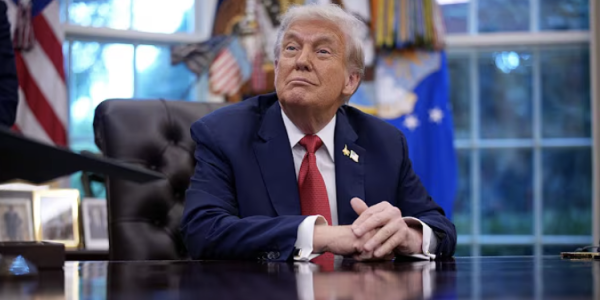What Pfizer’s new deal could mean for prescription drug costs in America
By
Veronica E.
- Replies 0
Prescription medications have long been a major expense for many Americans, especially older adults who often rely on multiple prescriptions each month.
Compared with patients in other wealthy countries, Americans regularly pay more—sometimes double or triple—for the same drugs.
Now, a new agreement between the White House and pharmaceutical giant Pfizer could signal a turning point.
At the heart of the plan is a federally run website called TrumpRx, expected to launch in early 2026, where discounted Pfizer medications will be sold directly online.
The move has already sparked both hope and questions about how much relief it will actually bring.

President Trump and Pfizer CEO Albert Bourla stood together in the Oval Office to announce that Pfizer would begin offering major discounts on a wide range of its prescription drugs.
The deal also includes lower prices for Medicaid recipients.
According to the White House, this agreement stems from the administration’s “most favored nation” order, designed to ensure Americans do not pay more for medications than people in other advanced economies.
US patients currently make up less than 5% of the global population but consume about 13% of prescription drugs, while also funding more than 70% of worldwide pharmaceutical profits.
That imbalance, officials say, has left Americans carrying much of the cost of global medical innovation.
Exact details have not yet been published, but President Trump stated that some Pfizer medications could see price reductions of 50% or more.
For patients taking brand-name prescriptions, such cuts could amount to hundreds or even thousands of dollars in annual savings.
Bourla described the deal as “historic,” adding that Americans had been unfairly subsidizing healthcare in other wealthy countries for years.
One key factor was the threat of tariffs. President Trump recently announced plans for a 100% tariff on any branded or patented pharmaceutical products not made in the US.
Facing the possibility of higher prices and reduced access to the American market, Pfizer agreed to relocate more of its production stateside in exchange for a three-year grace period on tariffs, along with commitments to lower drug prices.
While the details remain limited, here is what has been shared so far:
The government has not yet released a list of the specific drugs that will be included, though the program is expected to cover common treatments such as blood pressure and cholesterol medications.
Pfizer is the first to sign on, but officials say talks are underway with other major pharmaceutical companies.
Dr. Mehmet Oz, the new head of the Centers for Medicare and Medicaid Services, is expected to release more details later this year.
The administration’s larger goal is to pressure other drugmakers to join through the combined influence of federal purchasing power and tariff threats.
If you are over 60, this deal could directly affect your prescription costs.
Key points include:

There are still open questions:
At The GrayVine, we believe affordable healthcare should be accessible to all.
We’ll continue tracking this story to keep you informed as the rollout approaches.
Read next:

The TrumpRx program raises both optimism and uncertainty. For many, lower drug costs could be life-changing, while others worry about how the program will be implemented.
Have you had to skip or delay prescriptions because of cost? Do you think this plan will help? Share your thoughts—we’ll be covering every update closely.
Compared with patients in other wealthy countries, Americans regularly pay more—sometimes double or triple—for the same drugs.
Now, a new agreement between the White House and pharmaceutical giant Pfizer could signal a turning point.
At the heart of the plan is a federally run website called TrumpRx, expected to launch in early 2026, where discounted Pfizer medications will be sold directly online.
The move has already sparked both hope and questions about how much relief it will actually bring.

Pfizer’s new agreement with the White House could reshape the way Americans pay for prescription drugs. Image source: YouTube / MSNBC,
A historic agreement announced in Washington
President Trump and Pfizer CEO Albert Bourla stood together in the Oval Office to announce that Pfizer would begin offering major discounts on a wide range of its prescription drugs.
The deal also includes lower prices for Medicaid recipients.
According to the White House, this agreement stems from the administration’s “most favored nation” order, designed to ensure Americans do not pay more for medications than people in other advanced economies.
US patients currently make up less than 5% of the global population but consume about 13% of prescription drugs, while also funding more than 70% of worldwide pharmaceutical profits.
That imbalance, officials say, has left Americans carrying much of the cost of global medical innovation.
Also read: FDA issues urgent recall of mislabeled pain medication over life-threatening risks
How much could prices drop?
Exact details have not yet been published, but President Trump stated that some Pfizer medications could see price reductions of 50% or more.
For patients taking brand-name prescriptions, such cuts could amount to hundreds or even thousands of dollars in annual savings.
Bourla described the deal as “historic,” adding that Americans had been unfairly subsidizing healthcare in other wealthy countries for years.
Also read: Traveling with medication? Some over-the-counter drugs could cause trouble abroad
Why the sudden shift?
One key factor was the threat of tariffs. President Trump recently announced plans for a 100% tariff on any branded or patented pharmaceutical products not made in the US.
Facing the possibility of higher prices and reduced access to the American market, Pfizer agreed to relocate more of its production stateside in exchange for a three-year grace period on tariffs, along with commitments to lower drug prices.
What is TrumpRx and how will it work?
While the details remain limited, here is what has been shared so far:
- TrumpRx will be a federal website offering discounted Pfizer medications.
- The launch is expected in early 2026.
- All new Pfizer drugs sold in the US will be priced according to the “most favored nation” rule, matching what patients in other wealthy countries pay.
- Medicaid recipients will see additional discounts under the program.
The government has not yet released a list of the specific drugs that will be included, though the program is expected to cover common treatments such as blood pressure and cholesterol medications.
Also read: Lifesaving medication and programs at risk? What the leaked Trump proposal means for communities
Could other companies follow Pfizer’s lead?
Pfizer is the first to sign on, but officials say talks are underway with other major pharmaceutical companies.
Dr. Mehmet Oz, the new head of the Centers for Medicare and Medicaid Services, is expected to release more details later this year.
The administration’s larger goal is to pressure other drugmakers to join through the combined influence of federal purchasing power and tariff threats.
Also read: Could you be charged extra for Medicare without realizing it?
What seniors should know
If you are over 60, this deal could directly affect your prescription costs.
Key points include:
- Savings potential: If you take Pfizer medications, you may see meaningful reductions once TrumpRx is active.
- Price transparency: Buying through a federal site may make it easier to see true costs without extra fees.
- Medicaid discounts: Seniors on Medicaid could benefit immediately from lower prices.
- Possible expansion: If other drugmakers sign on, the range of discounted medications could grow.

Pfizer drugs may soon be available at lower prices through the upcoming TrumpRx program. Image Source: Pexels / Pixabay.
Also read: Common medications may be fueling a rise in deadly senior falls
What remains uncertain
There are still open questions:
- Which medications will qualify, and how much will each drop in price?
- Will Medicare or private insurance be usable on TrumpRx, or will it operate as a cash-only system?
- Will patients still be able to use local pharmacies, or will ordering shift entirely online?
- Will other pharmaceutical companies ultimately join?
What you can do now
- Stay updated: Follow announcements to learn if your prescriptions are affected.
- Ask your doctor: Find out whether your medications are made by Pfizer and how you might benefit from the new pricing.
- Share experiences: Talking about the impact of drug costs can help highlight the importance of affordable care.
At The GrayVine, we believe affordable healthcare should be accessible to all.
We’ll continue tracking this story to keep you informed as the rollout approaches.
Read next:
- Pharma giant pulls plug on new drug after concerning trial result
- What happened at CVS? Company responds to customer concern following major misstep
- Brace yourself: 250+ medications have already soared in price – what you need to know
Key Takeaways
- Pfizer has agreed to cut prices on many prescription drugs for Americans, following tariff threats and a deal with the White House.
- A new federal website, TrumpRx, will launch in early 2026 to sell discounted Pfizer medications online.
- The deal includes lower Medicaid prices and a commitment from Pfizer to move more production to the US.
- Other drug companies may join, but key details—such as which drugs are covered and how insurance will apply—remain unclear.
The TrumpRx program raises both optimism and uncertainty. For many, lower drug costs could be life-changing, while others worry about how the program will be implemented.
Have you had to skip or delay prescriptions because of cost? Do you think this plan will help? Share your thoughts—we’ll be covering every update closely.






